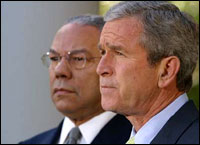Every European poll shows enormous percentages of people who oppose the pending war on Iraq: 70 percent, 80 percent, 90 percent. That’s an extraordinary consensus; it’s rare when 70 percent of people agree about anything.

Taking their anti-Bush sentiments to the streets in Prague.
Photo: Punchdown.org.
The consensus is all the more extraordinary because people aren’t really making an informed judgment. None of us, here or in France, are really capable of knowing with much accuracy whether the Bush administration’s argument — that Saddam Hussein represents such an immediate threat that he must be taken out — makes sense or not. We simply lack the necessary data.
But given that information vacuum, what’s stunning is how few people will give Washington the benefit of the doubt. You might imagine that our government has the best intelligence on Iraq (we’re the ones with the spy satellites, the U2s), but next to no one is buying it. Why? That’s among the most interesting, albeit not the most fateful, questions hanging over our march to war.
This deep, fundamental distrust seems to shock a lot of Americans, Colin Powell among them. But it’s completely explicable. In fact, I think the battle for world public opinion was lost two years ago, long before Sept. 11 (though that tragedy bought us enough sympathy to postpone the realization of our isolation). It was lost when we reneged on, refused, and sabotaged a series of international agreements, most notably the Kyoto Protocol on global climate change. And the main problem was not that we were perceived as arrogant, though we were. The main problem was that people simply couldn’t believe that we were willing to ignore what they had come to see as a clear and present danger, namely the Earth’s increasing climatic instability.

Their lips are sealed on Kyoto.
Photo: U.S. State Department.
Here was a situation in some ways like the war on Iraq. A threat is identified, and a course of action proposed. In this case, the threat of global warming had been painstakingly mapped out over the course of 10 years. This was no secret intelligence data, no low-resolution photo of trucks outside bunkers. This was a process as transparent as humanly possible, with the Intergovernmental Panel on Climate Change producing a massive scientific consensus that humans were heating the Earth. In addition, there was more than enough anecdotal evidence to convince most Europeans — a decade-long siege of bizarre winter storms, record river flooding, and stunning summer heat waves. Beyond that, the computer models were clearly beginning to show not only the threat of long term warming, but also the more-than-outside chance of violent destabilization. Western Europe, for instance, is kept temperate by the Gulf Stream, a deep-ocean circulation threatened by the intrusion of fresh water melting off the polar ice cap.
Climate change isn’t precisely the same kind of threat as an unstable dictator, but it’s not totally different, either. Saddam Hussein is this year’s problem, and global warming is this century’s. Both are ominous and unpredictable, but climate change will be permanent and planetary in its effects. The response to it — the Kyoto Protocol — is, by every account except the oil industry’s, moderate to the point of timidity, and by itself insufficient to dent the momentum of global warming. Nonetheless, it is clearly a necessary first step, hammered out over a decade of painstaking negotiations.
But in one impatient speech, President Bush managed both to suggest that the threat wasn’t really much of a threat, and that the response was some kind of well-honed dagger aimed at the heart of the U.S. economy. In other words, he proved unable to assess risk in a way that made sense to people who knew at least a little about the issue — the European public, for instance. His proposal to study the situation more was viewed as ridiculous, so much so that most people assumed it was simply an intellectually corrupt effort to help campaign contributors.
That one decision drew down Bush’s intellectual credit so far that there’s nothing left to write a check on. He is the president who cried “no wolf.” And so it should come as no great surprise that people are yelling it back at him across the Atlantic.



